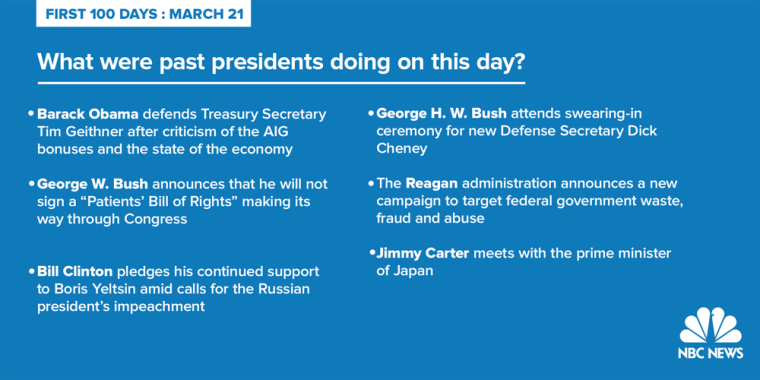First Read is a morning briefing from Meet the Press and the NBC Political Unit on the day's most important political stories and why they matter
It’s do-or-die time on health care for Trump, GOP
After one of Donald Trump's worst days as president — the FBI director confirming an investigation of his campaign's possible links to Russia, and repudiating his claim that Barack Obama wiretapped him — he makes his most difficult policy pitch of his first two months in office. At 9:15 am ET this morning, President Trump heads to Capitol Hill to sell House Republicans on the GOP legislation to repeal and replace parts of the Affordable Care Act.
The task isn’t easy: He needs to convince House conservatives who think the bill doesn’t go far enough and moderates who believe it leaves too many without insurance — all while not alienating skeptical GOP senators. And the stakes are enormous: If the House doesn’t pass the legislation on Thursday’s scheduled vote, then the effort to repeal and replace Obamacare is likely dead. And a failed vote imperils the rest of Trump’s early agenda, including tax cuts. According to NBC’s count, 17 House Republicans are opposed or leaning against the health-care bill, and the GOP can afford just 21 defections. “He’s the closer,” House Energy and Commerce Committee Chair Greg Walden (R-OR) said of President Trump on MSNBC’s “Morning Joe” yesterday. We’re about to find out if the president can seal the deal.
The 17 House Republicans who are against or leaning against the House GOP bill
- Rep. Jim Jordan (R-OH)
- Rep. Mark Meadows (R-NC)
- Rep. Justin Amash (R-MI)
- Rep. Dave Brat (R-VA)
- Rep. Raul Labrador (R-ID)
- Rep. Mo Brooks (R-AL)
- Rep. Rob Wittman (R-VA)
- Rep. Thomas Massie (R-KY)
- Rep. Tom Garrett (R-VA)
- Rep. Ileana Ros-Lehtinen (R-FL)
- Rep. Leonard Lance (R-NJ)
- Rep. Mark Amodei (R-NV)
- Rep. Jim Bridenstine (R-OK)
- Rep. Louie Gohmert (R-TX)
- Rep. Mark Sanford (R-SC)
- Rep. John Katko (R-NY)
- Rep. Brian Fitzpatrick (R-PA)
Can Republicans govern?
That’s one of the biggest questions in this entire debate. Can Republicans who were conditioned to say “no” during the Obama years say “yes” to legislation, no matter how imperfect it is? Per NBC’s Leigh Ann Caldwell and Alex Moe, House Speaker Paul Ryan and his team have made some changes to try to win over wavering lawmakers. Among them: repeal most of the Obamacare taxes in 2017 instead of 2018; make work requirements for Medicaid eligibility optional for states to implement; and instruct the Senate on how to deal with those ages 50-64 who will likely see their insurance costs skyrocket under the original GOP bill.
Also, the New York Times reports that they’ve crafted a special provision to woo New York State Republicans. These are typical kinds of changes and moves to pass legislation. But they’re also the same kinds of changes and moves that conservatives RAILED AGAINST during the Obama years. And they’re coming before the Congressional Budget Office can score these revisions. Make no mistake, House Republicans can still pass this legislation on Thursday. After all, this is maybe their last best chance to repeal and replace Obamacare. What’s more, they enjoy a 237-193 majority in the House. But can they accept the hard choices and half loafs needed to govern?
Is the House GOP bill good policy?
That’s the other important question in this debate. Per the Congressional Budget Office, the legislation will insure 14 million fewer Americans by next year — and 24 million fewer over the next 10 years. It currently lowers the deficit, but NBC’s Leigh Ann Caldwell notes that repealing the ACA taxes in 2017 instead of 2018 will lessen that deficit reduction (by how much we don’t know since there hasn’t been a revised CBO score). And the legislation disproportionately affects older and more rural Americans (while the House is instructing the Senate to fix this, we have no idea what that fix actually is — or how much it will cost).
The Republican reaction to Comey was striking
As one of us wrote yesterday, FBI Director James Comey’s testimony to the House Intelligence Committee was a political gut punch to President Trump. And the GOP’s reaction to yesterday’s Russia news was striking. White House Press Secretary Sean Spicer said, “General Flynn was a volunteer of the campaign,” downplaying the role of Trump’s former national security adviser. Spicer added, “Paul Manafort who played a very limited role, for a very limited amount of time," even though Manafort serviced as the campaign’s chairman. What’s more, Republicans on the House Intelligence panel were focused more on leaks than of the allegations of possible contacts/collusion between the Trump campaign and Russia. And House Intelligence Chair Devin Nunes (R-CA) told reporters he had never heard of Roger Stone or Carter Page.
“[Monday] was a bad day for President Trump. Really bad”
Here’s the assessment of Comey’s testimony by Lawfare’s Benjamin Wittes: “[Monday] was a bad day for President Trump. Really bad. Over the weekend, I wrote a short piece about how to understand the testimony FBI Director James Comey was to give today. The bottom line was that: ‘Comey's communicativeness with the committee—and through it with the public—will almost certainly be inversely proportional to the seriousness of the Russia investigation.’” And how communicative was Comey? He went out of his way not to offer details into the investigation. Wittes concludes, “[W]e learned that there is an open-ended Russia investigation with no timetable for completion, one that's going hang over Trump's head for a long time, and one to which the FBI director is entirely committed.”
Do Democrats filibuster Gorsuch? And do Republicans following by invoking the “nuclear option”?
Here’s NBC’s Caldwell teeing up Supreme Court nominee Neil Gorsuch’s second day before the Senate Judiciary Committee. “As Supreme Court nominee Neil Gorsuch enters his second day of confirmation hearings in the Senate, his fate is dependent upon the support of Democratic senators who are embroiled in partisan fighting over the politics of the high court and a controversial president. Democrats' concerns could lead to an explosive fight on the Senate floor that would hold up his nomination and potentially force Republicans to enact the so-called ‘nuclear option,’ a procedural move that would blow up Senate rules to pass President Donald Trump's nominee.
Operating in a hyper-partisan era with an unpopular new president, Gorsuch's judicial leanings will be one area of focus for Democrats, but hard feelings felt by Democrats over Republicans blocking the last Supreme Court nominee and Gorsuch's independence from President Donald Trump are other areas of concern. For now, it appears Republicans have the votes to get their nominee confirmed but it remains to be seen just how far they will need to go to get there.”
Trump’s Day
Trump heads to Capitol Hill to meet with House Republicans at 9:15 am ET… And he delivers remarks at a National Republican Congressional Committee dinner in DC at 7:30 pm ET.
What were other presidents doing on March 21?




